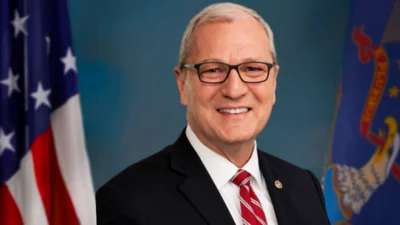Rolette County Emergency Management of North Dakota issued the following announcement.
NEWS: FOR IMMEDIATE RELEASE
Burgum declares statewide emergency for flooding, infrastructure damage caused by weekend storms; disaster declared for April 12-14 historic blizzard
Governor to survey damage, meet with locals in Crosby area Tuesday; plans to request presidential disaster declarations to unlock federal assistance
VIEW THIS RELEASE ONLINE: governor.ND.gov
BISMARCK, N.D. (APRIL 25, 2022) – Gov. Doug Burgum today declared a statewide emergency for flooding and widespread utility infrastructure damage caused by a severe winter storm last weekend that has left thousands of North Dakotans without electricity. The governor also has declared a disaster for areas impacted by record snowfall during the historic blizzard April 12-14 based on local costs incurred for snow removal.
Burgum plans to request presidential disaster declarations for both events to unlock federal assistance to help pay for snow removal and infrastructure repairs, including thousands of downed utility poles that must be replaced in western counties after last weekend’s storm brought a combination of freezing rain and high winds.
“From flooding in the east to power outages affecting thousands of residents in the west, to record April snowfall depleting snow removal budgets and hitting ranchers hard during calving season, this April has been an extremely challenging month for all North Dakotans,” Burgum said. “We appreciate the federal government considering these requests for assistance to help communities recover from these storms and build resiliency against future severe weather events. We’re especially grateful for the whole-of-government response by our state agencies as well as the incredible efforts by local emergency managers, first responders, road crews, health care workers and others to protect the lives and property of all North Dakota citizens.”
Burgum plans to visit the Crosby area in far northwest North Dakota on Tuesday to survey infrastructure damage and visit with local officials and residents affected by the weekend storm and power outages. Media interested in covering can email mnowatzki@nd.gov for details.
April 12-14 blizzard
The disaster declaration encompasses the three-day blizzard that occurred April 12-14 and dumped record amounts of heavy, wet snow on much of North Dakota, with more than 30 inches of snow and wind gusts over 60 mph reported in some areas. The blizzard forced schools to close and plugged city streets, rural roads and interstate highway underpasses for days.
The declaration covers 16 counties and the Mandan, Hidatsa and Arikara Nation. The counties are Billings, Bottineau, Dunn, Golden Valley, Grand Forks, McHenry, McKenzie, McLean, Mercer, Morton, Mountrail, Oliver, Renville, Sheridan, Stark and Ward.
While snow removal costs typically aren’t eligible for presidential disaster declaration assistance, exceptions may be granted for a historic storm if snow removal costs exceed the state’s infrastructure damage threshold for receiving a presidential declaration. In North Dakota, that threshold is approximately $1.3 million statewide.
April 22-24 storms
The emergency declaration stems from a spring storm that occurred Friday through Sunday, bringing freezing rain that coated power lines and poles with ice. Strong winds toppled hundreds of poles and snapped power lines, causing millions of dollars in damage. As the rain turned to snow, blizzard-like conditions made many roads impassable and prevented line crews from reaching areas to restore power. Thousands of customers in northwestern North Dakota remained without electricity Monday as utilities brought in extra crews to restore power.
In eastern North Dakota, heavy rains and snowmelt swelled creeks and rivers within the Sheyenne and Red River basins and swamped fields and ditches, causing overload flooding and inundating rural roads and state highways. The statewide emergency declaration direct states agencies to provide response resources and capabilities and makes North Dakota National Guard resources available if needed to support local and tribal governments.
The state declarations set the stage for requesting presidential disaster declarations, which if granted would unlock FEMA public assistance to help cities, counties and townships pay for the costs of snow removal and repairs to damaged utilities, roads and other infrastructure.
Agencies respond
North Dakota’s state agencies have been supporting local and tribal jurisdictions throughout the recent storms by identifying needs and assisting with resource coordination.
Today, the North Dakota Department of Health provided generators and a portable freezer to Divide County to heat an ambulance bay and save frozen goods from spoiling. The North Dakota Department of Emergency Services also delivered heater meals to support shelter operations in Williams County, while the North Dakota Department of Human Services has been working with North Dakota Voluntary Organizations Active in Disaster and community partners to coordinate additional support if needed.
In the east, the U.S. Army Corps of Engineers was requested to provide technical assistance with flood levee construction in Valley City. The North Dakota Department of Water Resources, in conjunction with Emergency Services, continues to monitor flood threats throughout the state and identify areas of concern.
Throughout these storms, the North Dakota Department of Transportation has been opening roads, while also clearing pathways for law enforcement and medical workers and power crews needing to access downed power lines. The North Dakota Highway Patrol also has investigated dozens of crashes, responded to hundreds of calls for service and assisted with road closures.
In addition to an emergency shelter in Williston, shelter locations are being identified in the northwest region of the state. Residents are asked to contact local officials if they need access to shelter facilities. Those affected by this weekend’s storm also are encouraged to check on their neighbors and friends to ensure they are safe.
— # # # —
C O N T A C T:
Mike Nowatzki
mnowatzki@nd.gov
701.328.2424
Mike Kennedy
mikekennedy@nd.gov
701.328.2937
600 E Boulevard Ave.
Bismarck ND 58505-0001
PHONE: 701.328.2200
Original source can be found here.


 Alerts Sign-up
Alerts Sign-up